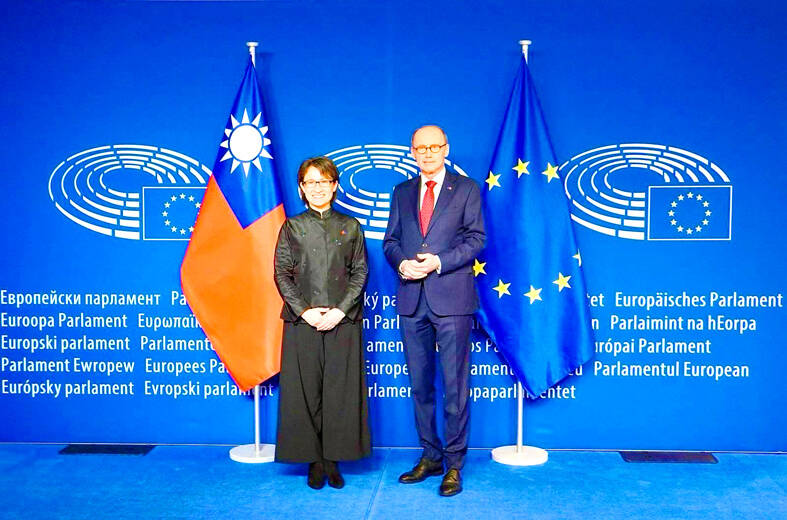Vice president-elect Hsiao Bi-khim (蕭美琴) visited the European Parliament at the invitation of lawmakers, a gesture that shows Taiwan and the EU are partners with shared values, the Ministry of Foreign Affairs said yesterday.
On behalf of European Parliament President Roberta Metsola, European Parliament First Vice President Othmar Karas welcomed Hsiao to the legislative body, making her the first vice president-elect of Taiwan to visit the European Parliament before being sworn in, the ministry said.
The visit would help Europe better understand Taiwan’s determination to safeguard peace and stability across the Taiwan Strait, as well as deepen and expand cooperation between Taiwan and the EU, it said.

Photo courtesy of the Ministry of Foreign Affairs
Hsiao also met with Reinhard Butikofer — a German member of the European Parliament and chairman of the parliament’s Delegation for Relations with the People’s Republic of China — and European Parliament-Taiwan Friendship Group chairman Michael Gahler.
Hsiao also exchanged views on issues of mutual interest with members of the European Parliament Committee on Foreign Affairs, the ministry said.
At a welcoming reception held by the friendship group, Hsiao thanked its members for their longstanding, firm support of Taiwan, adding that she hoped the EU would continue to back the democratic nation through concrete actions.
Taiwan and European countries have been engaging in ever-closer exchanges in the past few years, the ministry said, citing the European Council’s voicing of its opposition to “any unilateral attempts to change the status quo by force or coercion” for the first time in its meeting conclusions in June last year.
The EU is Taiwan’s fifth-largest trading partner and the largest source of foreign direct investment, with its member states investing a cumulative US$71.8 billion in the nation, it said.
Last year, Taiwan signed 29 cooperation agreements with European countries in fields such as agriculture, medicine, healthcare, education, culture, science and technology, it said.
That same year several Taiwanese ministers also visited EU countries, while 74 delegations of European parliamentarians and administrative officials were invited to visit Taiwan, it added.
As a responsible member of the Indo-Pacific region, Taiwan would continue to deepen cooperation with like-minded partners such as the EU and the European Parliament to safeguard global and regional security and prosperity, it said.
This story has been amended since it was first published.

MORE VISITORS: The Tourism Administration said that it is seeing positive prospects in its efforts to expand the tourism market in North America and Europe Taiwan has been ranked as the cheapest place in the world to travel to this year, based on a list recommended by NerdWallet. The San Francisco-based personal finance company said that Taiwan topped the list of 16 nations it chose for budget travelers because US tourists do not need visas and travelers can easily have a good meal for less than US$10. A bus ride in Taipei costs just under US$0.50, while subway rides start at US$0.60, the firm said, adding that public transportation in Taiwan is easy to navigate. The firm also called Taiwan a “food lover’s paradise,” citing inexpensive breakfast stalls

TRADE: A mandatory declaration of origin for manufactured goods bound for the US is to take effect on May 7 to block China from exploiting Taiwan’s trade channels All products manufactured in Taiwan and exported to the US must include a signed declaration of origin starting on May 7, the Bureau of Foreign Trade announced yesterday. US President Donald Trump on April 2 imposed a 32 percent tariff on imports from Taiwan, but one week later announced a 90-day pause on its implementation. However, a universal 10 percent tariff was immediately applied to most imports from around the world. On April 12, the Trump administration further exempted computers, smartphones and semiconductors from the new tariffs. In response, President William Lai’s (賴清德) administration has introduced a series of countermeasures to support affected

CROSS-STRAIT: The vast majority of Taiwanese support maintaining the ‘status quo,’ while concern is rising about Beijing’s influence operations More than eight out of 10 Taiwanese reject Beijing’s “one country, two systems” framework for cross-strait relations, according to a survey released by the Mainland Affairs Council (MAC) on Thursday. The MAC’s latest quarterly survey found that 84.4 percent of respondents opposed Beijing’s “one country, two systems” formula for handling cross-strait relations — a figure consistent with past polling. Over the past three years, opposition to the framework has remained high, ranging from a low of 83.6 percent in April 2023 to a peak of 89.6 percent in April last year. In the most recent poll, 82.5 percent also rejected China’s

PLUGGING HOLES: The amendments would bring the legislation in line with systems found in other countries such as Japan and the US, Legislator Chen Kuan-ting said Democratic Progressive Party (DPP) Legislator Chen Kuan-ting (陳冠廷) has proposed amending national security legislation amid a spate of espionage cases. Potential gaps in security vetting procedures for personnel with access to sensitive information prompted him to propose the amendments, which would introduce changes to Article 14 of the Classified National Security Information Protection Act (國家機密保護法), Chen said yesterday. The proposal, which aims to enhance interagency vetting procedures and reduce the risk of classified information leaks, would establish a comprehensive security clearance system in Taiwan, he said. The amendment would require character and loyalty checks for civil servants and intelligence personnel prior to